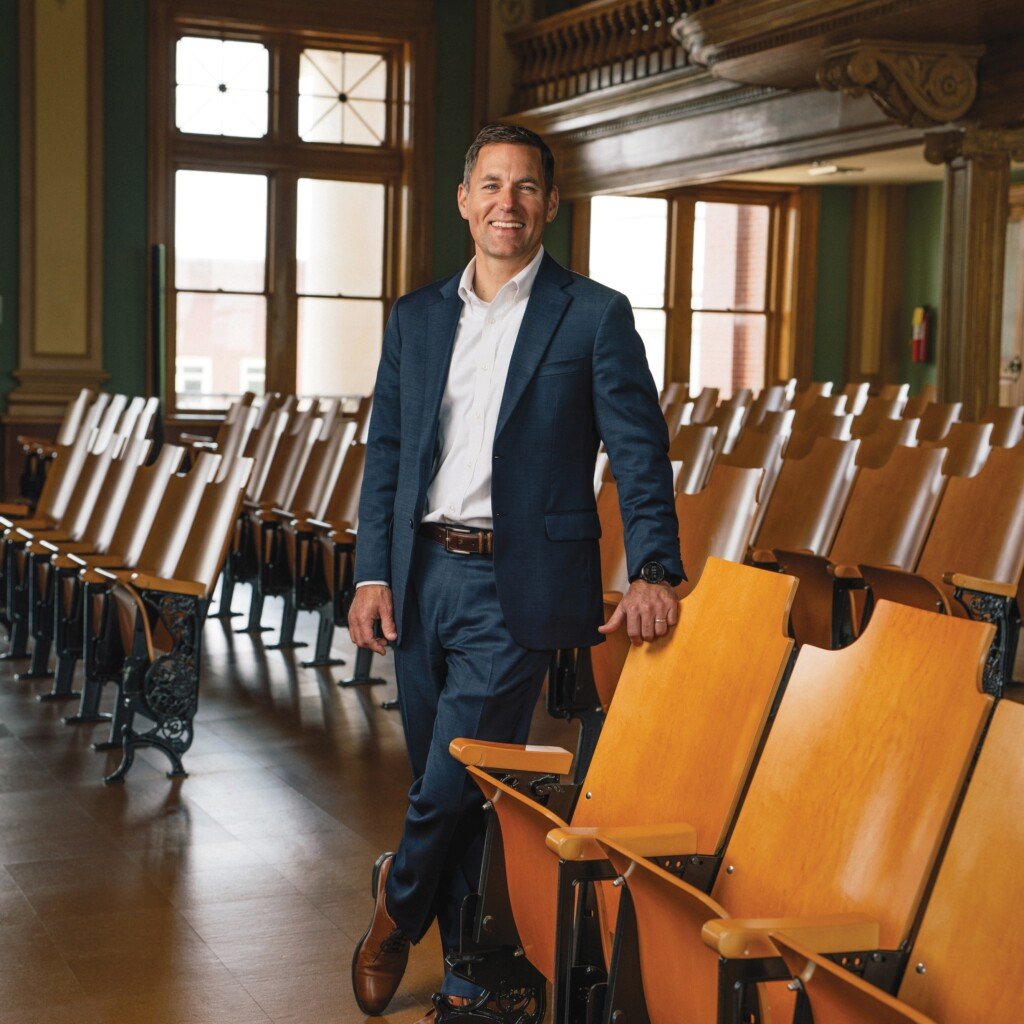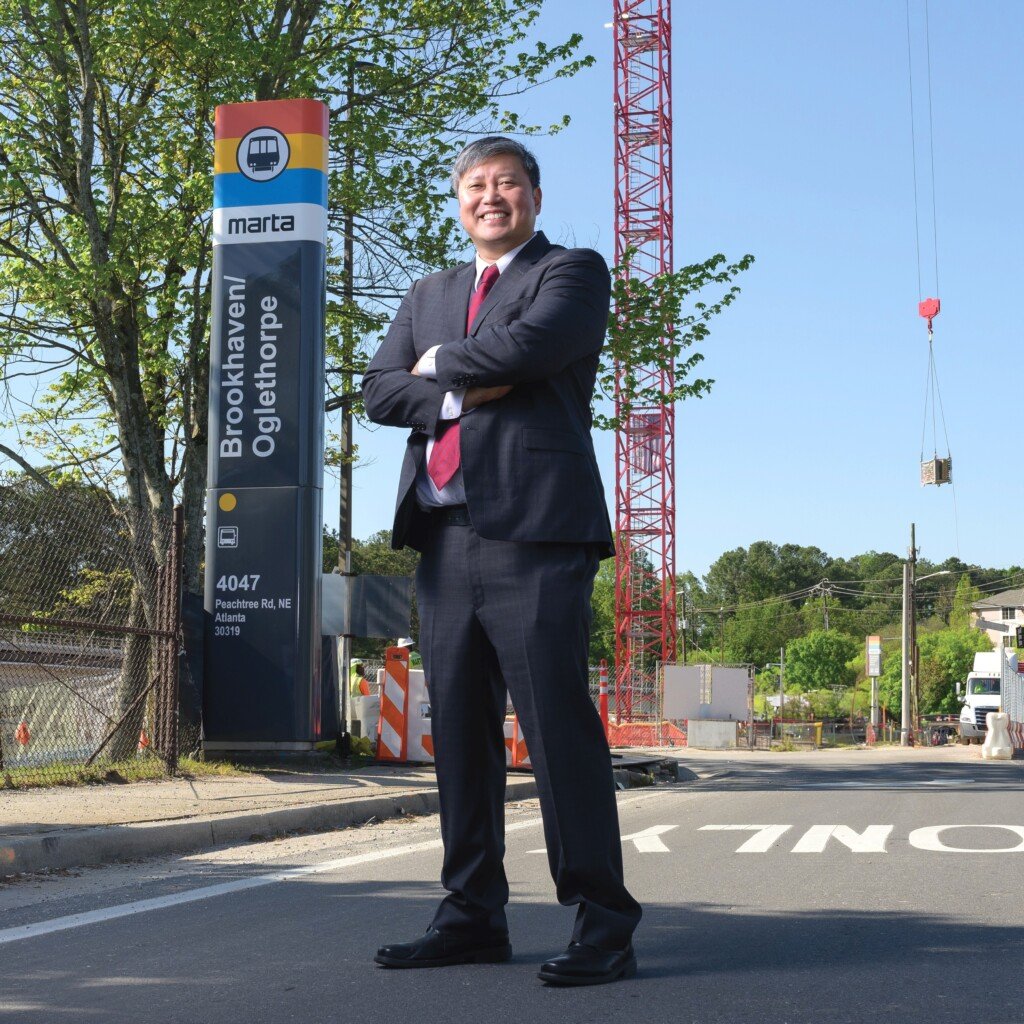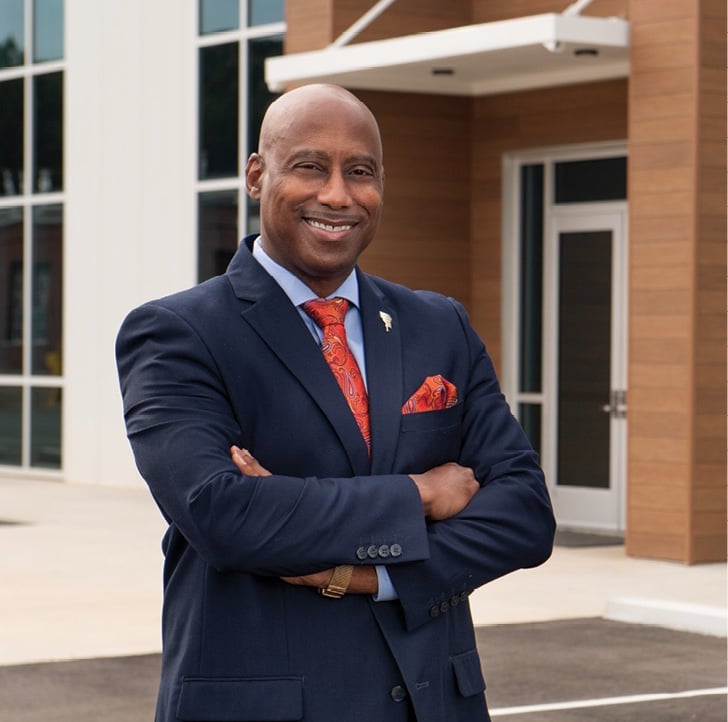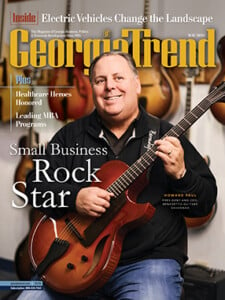Muscogee County | Columbus: Partnerships Drive Success
Filmmaking, outdoor recreation and healthcare
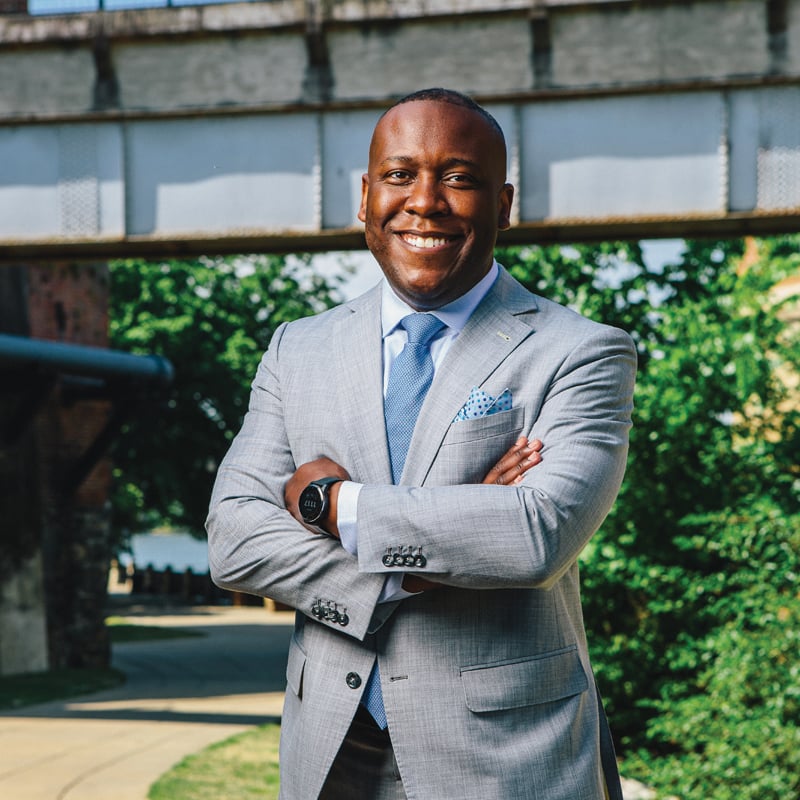
In Columbus, there’s always something new being built: a hotel, a school or even an entire industry. The city of 200,000 has long punched above its weight in the business community, as the home of major corporations like Aflac, Synovus and TSYS (now a subsidiary of Global Payments).
Military men and women from across the country come to Fort Benning, home of the infantry and the Army Maneuver Center of Excellence. But many other big names are also based in Columbus. If you’ve ever cooked on a Char-Broil grill, lit a Tiki Torch or worn a Salt Life shirt, you’ve felt the influence of a Columbus business. And you may soon see the city on your television as well.
Lights, Camera, Action
Columbus owed its strength originally to its founding atop the navigable portion of the Chattahoochee River, which led to its prominence as a mill town and today as a magnet for tourists looking for recreation and eager to experience the world’s longest urban whitewater course.
And the city’s leaders are much more interested in building the future than in rehashing the past. As the film industry continues growing in Georgia, Columbus aims to get in on the act in a major way.
Flat Rock Studio, a partnership between Columbus State University (CSU) and W.C. Bradley Co., is a repurposing of an old industrial building that now provides a full 180,000 square feet of film production space. It’s part of a nearly 80-acre campus with state-of-the-art facilities absent noise or traffic and yet located just over an hour’s drive from the Atlanta airport.
Multiple film projects are already underway at Flat Rock. Even more important, the future is under construction thanks to CSU’s new nexus degree in film and production, which graduated its first two students into the workforce in December. The program will provide the skilled workers Columbus needs to join Atlanta and Savannah as a film destination. Not only are all the necessary skills taught on-site, students can literally find an internship without leaving the building.
A study released last fall by the University System of Georgia estimated CSU’s economic impact at $290.5 million for 2019, generating 3,056 jobs in the process. Of those jobs, two-thirds are off campus and created as a result of spending by the institution.
CSU President Christopher Markwood stresses that partnerships are what drive innovation and success in the city. “The whole film discussion in Columbus, and what has come out of those discussions, is a prime example of the partnership culture here,” he says. “It began as a conversation about how Columbus could become the third film hub in the state.”
And while CSU was one of the first major tenants in a revived Uptown, he says that the overwhelming majority of the school’s facilities in the area were funded privately, yet another example of the partnership culture.
“That’s the story of Columbus,” he says. “You can look at example after example of folks coming together to make something happen.”
Mayor Skip Henderson is quick to agree. “Partnerships are what Columbus is built on,” he says.
The other partner in the Flat Rock Studio venture, W.C. Bradley Co. Real Estate, is hard at work on a number of additional projects, actively shaping the next phase of Uptown.
The $30 million Hotel Indigo opened in February, with two restaurants and spectacular views of the river. It’s the first new downtown hotel in 40 years and part of the four-phase River Place development, which includes a 226-unit apartment complex and will eventually feature a grocery store, a second multifamily development, a parking garage and a Class A office tower.
Pace Halter, president & COO of W.C. Bradley Co. Real Estate, proudly points out the various pieces of Columbus history laced throughout the hotel’s interior, such as green woven handles on the nightstands that pay homage to Fort Benning and pine wood at the elevator entrance that was reclaimed from an old W.C. Bradley mill, and says it has been “shockingly busy” during its first few months in operation.
Three other hotels are expected to open within the next 12 months. Columbus also now boasts its own collective eatery with indoor and outdoor dining spaces plus room for bars and music performances. Banks Food Hall, constructed in a historic building overlooking the river, has six tenants, with two on the way and two more openings remaining before the space fills up.
Spirit of Innovation
Greater Columbus Georgia Chamber of Commerce President and CEO Jerald Mitchell came to the city from a position with the Atlanta BeltLine last year, and he aims to bring the transformative nature and spirit of that project to his new home.
Columbus boasts the Dragonfly Trail, spanning 34 miles along the Chattahoochee River and points beyond. The trail is being expanded and will ultimately include more than 60 miles of interconnected paths.
Trails are good for recreation, and they’re an economic development opportunity and a workforce development tool, not only attracting new talent but helping retain talent that’s already in the city.
“Young talent chases the opportunity,” Mitchell says. “We have to help our young people see their future here in Columbus.”
He aims to have Columbus mentioned in the same breath as Atlanta, Charleston and Nashville, and sees the next generation of success stories being written through initiatives like the Columbus 2025 strategic planning project and the StartUP Columbus business incubator program. Another project Mitchell hopes to see become reality is the proposed Interstate 14, which would link El Paso, Texas, to Augusta through Columbus.
Joining CSU, Mercer University, is set to complete a medical campus in Columbus that’s been in the works for more than a decade. First- and second-year medical students have studied in the city for years. Now the school is opening a four-year medical campus that at full capacity will reach 240 students, similar to the enrollment at Mercer’s Macon and Savannah medical campuses. The new medical school will welcome its first class in August.
“This could end up being the biggest driver in the Uptown area in over a decade,” says Henderson. “This campus has been constructed right on the river as a partnership between Mercer and the city of Columbus. It can be a game-changer. We’ll have 90 high-paid faculty individuals, and then going from having 50 or 60 medical students to 240 is going to be a huge economic impact.”
The campus is the realization of a decade-long dream that started when city leaders trekked to Macon, Mercer University’s home, to make the case for a medical campus in their city.
“We’ve found both Columbus hospitals to be very strong. Our students have done well, learned a lot in their residencies and felt that they had a very good experience,” says Mercer School of Medicine Dean Jean Sumner. “Mercer has been embraced by the community in an amazing way. Many students have started returning back to Columbus and more are on the way.”
Innovation is also taking place at Fort Benning, where new robotics being developed could help keep troops out of harm’s way.
“We have an organization here called the Maneuver Capabilities Development and Integration Directorate, or MCDID, which develops future force capabilities, specifically for the infantry and armor force,” says Maj. Gen. Patrick Donahoe, commanding general of the U.S. Army Maneuver Center of Excellence at Fort Benning. “There is obviously a considerable effort to develop and improve our unmanned air and ground vehicles, but we are also looking at how our formations will need to fight in future conflicts, and making changes to our doctrine and training methodologies to keep our force prepared for what may come next.”
Regional Hub
While Columbus is important in its own right, it also serves as a regional hub for rural Georgia. Not only are Mercer students likely to come back and serve the Columbus area after graduation, some will probably venture into the surrounding rural areas to practice medicine. This will be crucial to Southwest Georgia, which includes some of the most medically underserved areas in the U.S.
“To the south of Columbus are some of the poorest counties not only in Georgia, but in the entire country,” says Henderson. “Mercer’s mission for providing access to affordable healthcare is going to be a game changer. It’s not just going to help us, it’ll help many of these communities that don’t have reliable access to healthcare.”
Synovus is doing its part to help the surrounding community as well. The bank donated $1 million to the Mercer project. It has also donated $1 million to the United Negro College Fund and established the Synovus/Calvin Smyre Scholarship Fund for Black students, named for the former Synovus executive and current state representative.
“This is part of our ‘here matters’ program,” says Synovus Executive Vice President and Chief Communications and Corporate Responsibility Officer Alison Dowe. “We’re pursuing the best ways to provide traditional opportunities to promote equality in higher education and close the economic gap. Calvin is a longtime member of our team, he’s important to this company, to our region and to our state.”
Dowe describes Synovus as a grassroots company despite having a five-state footprint covering much of the Southeast. Like the city’s other big players, it’s an asset that partners with others not only locally but across the state – and is an example of the leadership that has propelled Columbus forward.
“This community has been built with strong, visionary, private leadership,” says Henderson. “The partnerships with those individuals have created a diverse and one-of-a-kind community. We offer a little something for everyone.”
Local Flavor
Ma Rainey’s Home
Millions of film and music fans around the world delighted at Ma Rainey’s Black Bottom, the 2020 Netflix drama that received five Academy Award nominations and proved to be Chadwick Boseman’s final performance.
But the movie failed to mention one crucial aspect of Rainey’s life: Columbus and the Liberty Theatre.
Rainey not only grew up in Columbus and made her performing debut there, she also spent the last five years of her life in her hometown, managing local Black theaters including the iconic Liberty Theatre. Just a quarter mile away is the Ma Rainey House, which Rainey lived in at the time of her death in 1939. Both stand as testament to the importance of the city in Rainey’s life and in the blues she became famous for.
The theater opened in a segregated city in 1924 as its first Black theater, hosting acts like Rainey, Cab Calloway, Ella Fitzgerald, Duke Ellington and Lena Horne. Later it became a movie theater, then closed in 1974 after integration. Twenty years later, an extensive restoration project led by state Rep. Calvin Smyre restored it to its former glory as the center of the Liberty Heritage Historic District.
“The Liberty Theatre is located on Eighth Avenue, which was a hub of Black Columbus back then,” says Shae Anderson, managing director of the Liberty Theatre Cultural Center and Smyre’s daughter. “There were Black-owned businesses, restaurants, insurance companies, barber shops, things like that. My dad is 78, and people his age remember going there to watch movies, paying in change and a couple of RC bottle caps.”
Unfortunately, the Liberty needs renovating and expanding again and hasn’t hosted a play since 2016. “I hope to see it restored again today because it is a historic building on the National Register of Historic Preservation,” says Anderson. “We want it preserved for the community now and for future generations.”
To help make this happen, she’s working with the Fox Theatre Institute on a new strategic plan.
Even before the hit film, Columbus honored Rainey on a regular basis with concerts held to celebrate her birthday. Now, with the theater serving as a promotional partner for Ma Rainey’s Black Bottom, perhaps the increased interest following its success can be the catalyst that restores the Liberty Theatre once more.
Jerald Mitchell, president and CEO of the Greater Columbus Georgia Chamber of Commerce, says Rainey’s influence can’t be denied, nor can the city’s influence on her life and career.
“There would be no Billie Holiday without Ma Rainey,” he says.
